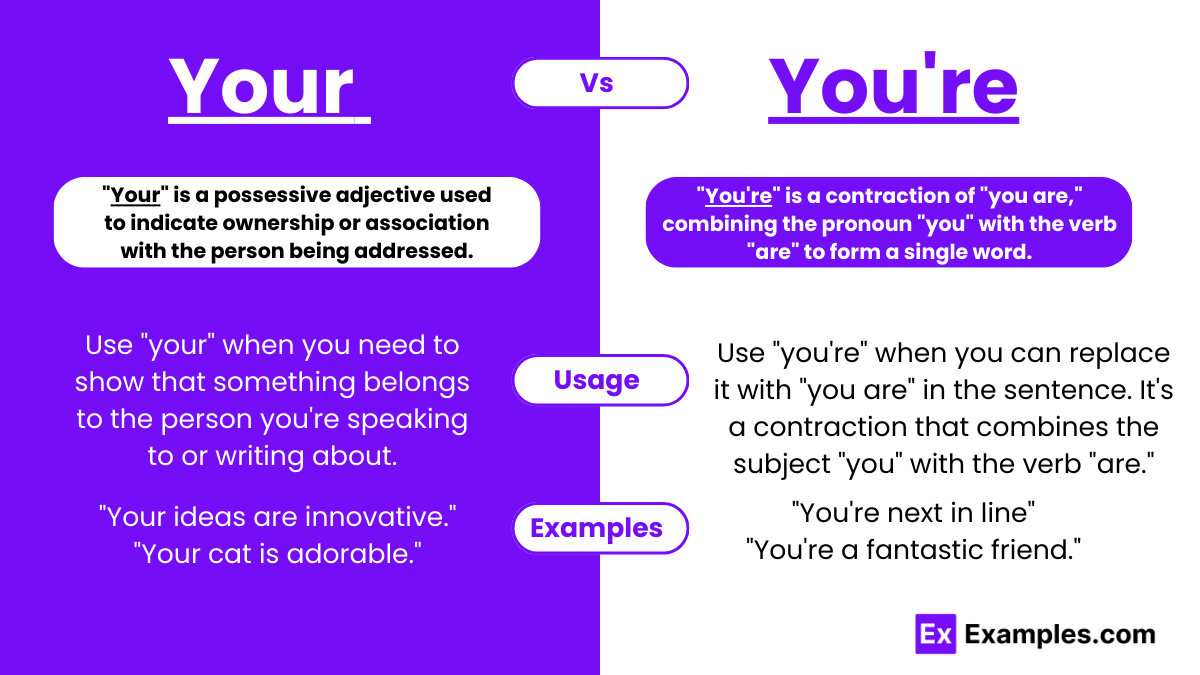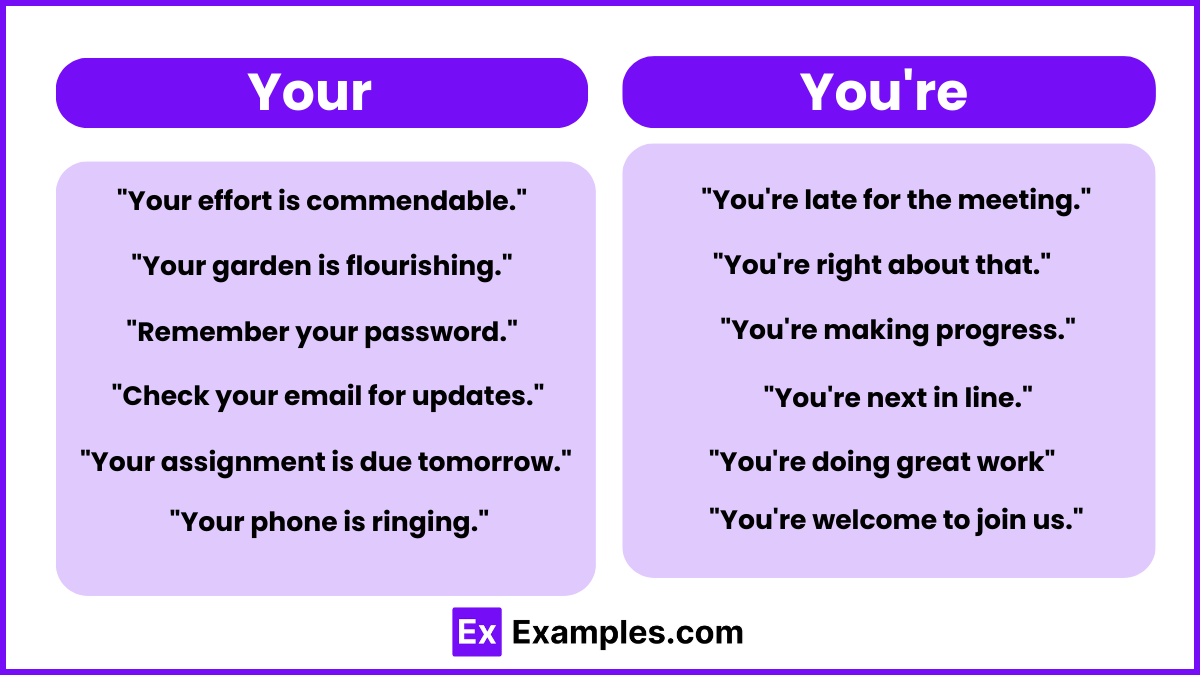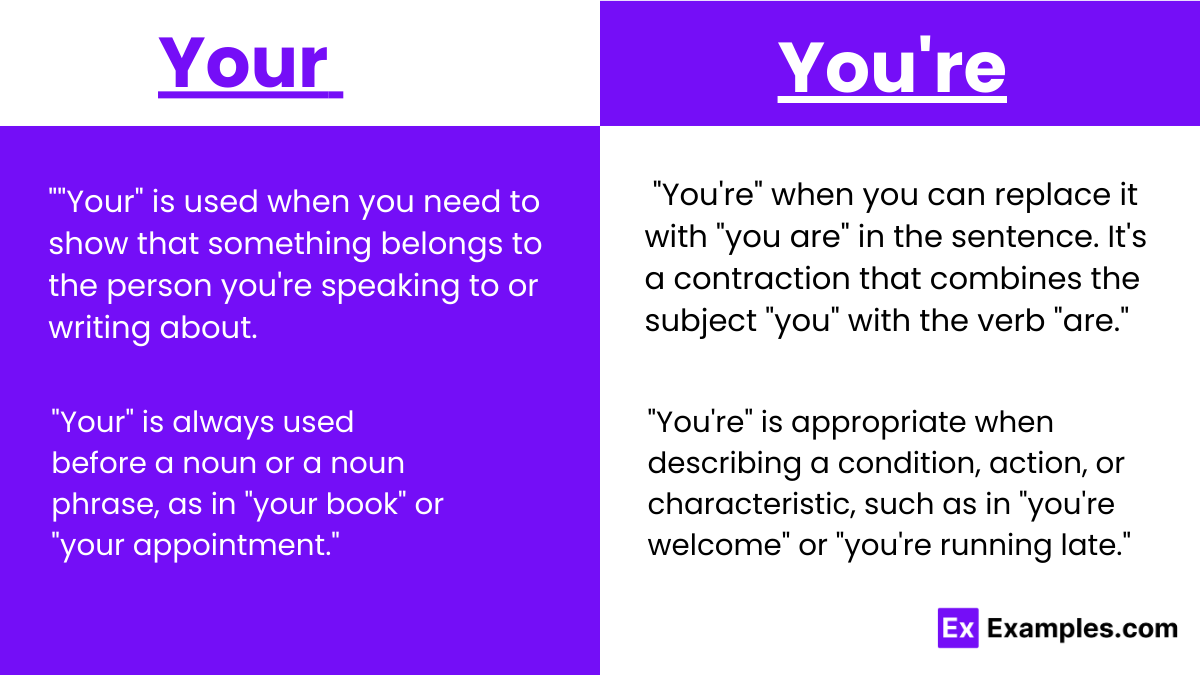Your vs You’re – Examples, Differences, Usage
Navigating the tricky terrain of English homophones, particularly “your” and “you’re,” presents a common challenge even for native speakers, not to mention those new to the language. These words, sounding identical but differing in spelling and meaning, frequently lead to errors in writing. The distinction between them is crucial, as “your” denotes possession, implying ownership or association, whereas “you’re” is a contraction for “you are,” used to describe a state of being or action. This article aims to demystify these commonly confused words, ensuring that readers can confidently use them correctly in their writing.
The misuse of “your” and “you’re” often goes unnoticed by spell-checkers, which typically focus on spelling rather than context, making it all the more important to grasp their proper usage. By remembering that “you’re” can be replaced with “you are” in a sentence, users can easily check their writing for accuracy. Despite the apostrophe in “you’re” typically signifying possession, in this case, it indicates the omission of the letter “a” from “are,” a hallmark of contractions. Through examples and explanations, this article will provide a clear guide on when and how to use “your” and “you’re,” empowering readers to avoid common pitfalls and enhance their writing clarity.
Your and You’re – Meanings
“Your” and “you’re” are two English words that often cause confusion due to their similar pronunciation, yet they have distinctly different meanings and functions in a sentence.
Your -“Your” is a possessive adjective used to indicate ownership or association with the person being addressed.It modifies a noun, showing that something belongs to ‘you’, the person being spoken to or written about. For example, in the sentence “Is this your book?” “your” is used to inquire whether the book belongs to the person being addressed.
You’re -On the other hand, “you’re” is a contraction of “you are,” combining the pronoun “you” with the verb “are” to form a single word. “You’re” is used to describe or convey a state of being or action pertaining to ‘you’, the person being addressed. An example sentence using “you’re” is “You’re going to love this movie,” which means “You are going to love this movie.”
Summary
Homophones like “your” and “you’re” often lead to confusion, not only among English learners but also among native speakers, due to their identical sounds but different meanings and spellings. “Your” serves as a possessive adjective, indicating ownership and is always paired with a noun within sentences. Conversely, “you’re” is a contraction of “you are,” identifiable by its apostrophe, and typically avoided in formal or academic writing due to its informal nature. Spell check tools might not always flag incorrect usage of these words, as both can be spelled correctly but used in the wrong context. A simple trick to ensure proper usage is to substitute “you’re” with “you are” in the sentence; if it still reads correctly, “you’re” is the appropriate choice, otherwise, “your” should be used. This method can help maintain clarity and accuracy in communication.
Difference Between Your and You’re
Understanding the difference between “your” and “you’re” is essential for clear and effective communication in English. These two words, often confused due to their similar pronunciation, have distinct meanings and uses. “Your” is a possessive adjective, indicating ownership or association, whereas “you’re” is a contraction of “you are,” representing a state of being or action. Here’s a table highlighting ten key differences to help differentiate between these commonly mixed-up homophones.
| Aspect | Your | You’re |
|---|---|---|
| Definition | Possessive adjective indicating ownership. | Contraction of “you are.” |
| Function | Modifies a noun to show possession. | Serves as a verb phrase to describe a state or action. |
| Usage | Used before a noun. | Used before an adjective or a verb-ing form. |
| Example | “Is this your book?” | “You’re going to love this.” |
| Apostrophe | Does not contain an apostrophe. | Contains an apostrophe to indicate the omission of ‘a’ in “are.” |
| Formality | Common in both formal and informal writing. | Often avoided in formal writing due to its contraction form. |
| Context | Indicates that something belongs to the person addressed. | Indicates what the person addressed is or is doing. |
| Replacement Test | Cannot be replaced with “you are.” | Can be replaced with “you are” without changing the meaning. |
| Error Detection | Misuse might not be caught by spellcheckers. | Misuse might not be caught by spellcheckers. |
| Common Mistakes | Incorrectly used in place of “you’re.” | Incorrectly used in place of “your.” |
Examples of Your and You’re
Navigating the tricky waters of homophones in the English language can often lead to confusion, particularly with words like “your” and “you’re.” These terms sound identical when spoken but carry completely different meanings and uses in written communication. “Your” is a possessive adjective, signifying ownership or relation to the person being addressed, while “you’re” is a contraction of “you are,” used to describe a state of being or action. Understanding the distinction between these two can greatly improve clarity and precision in writing. Here are examples to illustrate the proper usage of each:
Examples of “Your”:
- “Is this your coat hanging in the closet?”
- “I think your idea for the project is brilliant.”
- “Remember to bring your ID to the exam.”
- “Your performance in the play was remarkable.”
- “Please make sure your phone is on silent during the meeting.”
Examples of “You’re”:
- “You’re going to be amazed by the ending of the movie.”
- “If you think you’re ready, we can start the test.”
- “You’re making a huge difference with your efforts.”
- “I believe you’re the best person for this job.”
- “You’re welcome to join us for dinner tonight.”
These examples aim to help differentiate between “your” and “you’re,” ensuring that the intended message is effectively communicated without ambiguity.
When to Use Your vs You’re
Usage of “Your”
- Indicates Possession: Use “your” when you need to show that something belongs to the person you’re speaking to or writing about. For example, “your car,” “your ideas.”
- Precedes a Noun: “Your” is always used before a noun or a noun phrase, as in “your book” or “your appointment.”
- No Contraction: “Your” does not contain an apostrophe, as it is not a contraction but a possessive adjective.
Usage of “You’re”
- Contraction for “You Are”: Use “you’re” when you can replace it with “you are” in the sentence. It’s a contraction that combines the subject “you” with the verb “are.”
- Describes a State or Action: “You’re” is appropriate when describing a condition, action, or characteristic, such as in “you’re welcome” or “you’re running late.”
- Contains an Apostrophe: The presence of an apostrophe in “you’re” indicates it’s a contraction, distinguishing it from the possessive adjective “your.”
FAQs
Why Are They Easy to Confuse?
“Your” and “you’re” sound identical, making them easy to confuse. Their similar pronunciation but different meanings—a possessive adjective versus a contraction for “you are”—often leads to mix-ups in writing, despite their distinct uses.
What Do I Use You’re For?
Use “you’re” as a contraction for “you are.” It’s suitable when describing a state or action related to the person you’re addressing, like “you’re welcome” or “you’re talented.”
Is It Your Right or You’re Right?
The correct expression is “you’re right,” which is a contraction of “you are right.” It’s used to agree with someone or acknowledge the correctness of their statement.
Is You’re Grammatically Correct?
Yes, “you’re” is grammatically correct when used appropriately as a contraction for “you are.” It’s essential to ensure it’s used in contexts where “you are” fits the sentence structure





